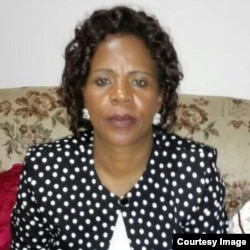Zimbabwean parliamentarians crossed party lines in the House of Assembly on Tuesday to protest against human trafficking by leaving their assigned seats to sit on the floor, expressing anger over the trafficking of women and girls to Arab states like Kuwait.
Biata Beatrice Nyamupinga, Zanu PF’s Goromonzi West lawmaker and chairperson of the parliamentary committee on gender, said she was impressed at the stance taken by the parliamentarians expressing their disdain on human trafficking.
“Some women and men from both the ruling party and the opposition have been angered by the reports we have been receiving on how women and girls who were trafficked to Kuwait by employment agents were abused by their so-called employers,” said Nyamupinga.
She said the lawmakers were later asked by the Speaker of Parliament, Jacob Mudenda, to return to their seats so that business of the house could proceed.
Although Mudenda noted that he was passionate about the human trafficking issue at hand as he had been instrumental in bringing the women and girls back from Kuwait, he felt the discussions could better be continued from their seats. The parliamentarians obliged.
“We hope that the discussions will continue tomorrow as we did not form a quorum today and our wish is that more awareness on the issue reaches our women and girls especially those in the rural areas so that they do not get lured into dubious job opportunities that will later put their lives at risk.
“We have heard harrowing reports of how some of the women were abused beyond measure and we hope that they will receive the help they need from both the Government and other organizations,” said Nyamupinga.
Over 200 women and girls are believed to have been trafficked to Arab states with the largest number going to Kuwait.
A few weeks ago a parliamentary committee led by Mudenda, who had visited Kuwait on parliamentary business, were briefed by the Zimbabwe Embassy about the plight of human trafficked women and girls, who were promised good jobs only to be turned into slaves and sex objects.
Thirty-two of them were repatriated back to Zimbabwe with the help of a local business, Wicknell Chivayo, as government could not fund the process.
Twenty-one more women and girls were repatriated last week with the assistance of the Young Women’s Christian Association led by Nyaradzayi Gumbodzvanda and six more are expected to leave Kuwait for Zimbabwe this week.
Credit has been given to the Zimbabwe Embassy in Kuwait for helping the women and girls that escape their employers with some of the human trafficking victims telling Studio7 they had no money to pay for taxi fares from their abusers but got a reprieve once they contacted the Embassy.
Zimbabwe Embassy staff in Kuwait have not been able to speak on record but human trafficking victims, who spoke to Studio7, said a Mr. Francis Ngwenya and others had been very helpful in facilitating their repatriation process despite the financial challenges facing most embassies.
In another development, a delegation of Zimbabwe’s House of Assembly led by Kindness Paradza, chairperson of the parliamentary committee on foreign relations, is on a week-long study tour in Palestine.
Paradza said they hope to share their findings with other parliamentarians back home.







